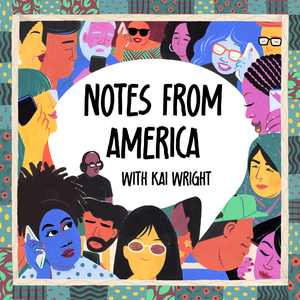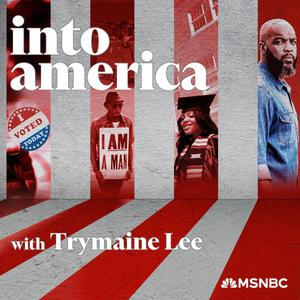
The History of American Slavery
Slate Podcasts
America's defining institution, as told through the lives of nine enslaved people.
- 33 minutes 54 secondsGabfest Reads | Finding Connection in the Aftermath of History’s Horrors
Emily Bazelon talks with author Yael van der Wouden about her debut novel, The Safekeep. They discuss why Yael chose a queer love story, how Yael’s own Dutch and Jewish heritage influenced her writing, the history of dispossession after World War II, and more.
Tweet us your questions @SlateGabfest or email us at [email protected]. (Messages could be quoted by name unless the writer stipulates otherwise.)
Podcast production by Cheyna Roth.
Learn more about your ad choices. Visit megaphone.fm/adchoices
18 January 2025, 8:00 am - 1 hour 4 minutesHit Parade | The Freewheelin’ Edition Part 1
At the movies, A Complete Unknown depicts Bob Dylan as a 1960s “it” boy—played by a 2020s “it” boy, Timothée Chalamet. But the film ends in 1965. What happened in the six decades after that?
Dylan not only kept recording. He actually started topping the charts—in the 1970s, the era of Led Zeppelin, not Pete Seeger. And several of his chart-topping albums came decades later, in the 21st century. Bob’s voice got rougher, but loyal audiences kept buying his music.
Several of these platinum Dylan LPs are among the most acclaimed in rock history—from Blood on the Tracks to Time Out of Mind. And Dylan stayed an object of fascination through all his changes—as a road warrior, a born-again Christian, a Traveling Wilbury, a JFK conspiracy theorist.
Join Chris Molanphy as he walks through Bob Dylan’s career decade by decade, from his ’60s folkie years to his 21st-century revival. With the biopic reviving interest in rock’s poet laureate, there’s never been a better time to get tangled up in Bob.
Podcast production by Kevin Bendis.
Learn more about your ad choices. Visit megaphone.fm/adchoices
18 January 2025, 3:30 am - 1 hour 17 minutesCulture Gabfest: Babygirls and Nickel Boys
On this week’s show, Slate staff writer Nadira Goffe sits in for Stephen. First, the panel explores Babygirl and its kinks. The latest feature from Dutch writer-director Halina Reijn stars Nicole Kidman and Harris Dickinson, and is fascinated by sex (mostly, as a concept.) Then, the three puzzle over Nickel Boys and the film’s audacious use of first-person point-of-view in filmmaker RaMell Ross’ adaptation of Colson Whitehead’s Pulitzer Prize-winning novel, The Nickel Boys. Finally, what does a Hollywood smear campaign look like? The trio discusses the messy legal and PR conflict embroiling Blake Lively and former It Ends With Us co-star and director, Justin Baldoni.
In the exclusive Slate Plus segment, the panel checks in with Julia and production assistant Kat, as they share their experiences of the L.A. wildfires.
Email us at [email protected].
Endorsements:
Nadira: Transa by Red Hot Org. Specifically, “Is It Cold In The Water” performed by Moses Sumney and ANOHNI.
Julia: Niksa sleep masks.
Dana: Exploring your local college radio stations. She likes WFUV (owned by Fordham University) and Columbia University’s WKCR.
Podcast production by Vic Whitley-Berry. Production assistance by Kat Hong.
Learn more about your ad choices. Visit megaphone.fm/adchoices
15 January 2025, 8:00 am - 35 minutes 12 secondsHit Parade | The Bridge: Slate Music Club 2024
The Slate Music Club is back, in a special edition of Hit Parade – “The Bridge”! Our year-end panel of critics—NPR Music’s Ann Powers, Hearing Things’ Julianne Escobedo Shepherd, Slate’s own Carl Wilson and Hit Parade host Chris Molanphy—discuss their favorite albums and singles and the trends that shaped the year in pop, rap, country, Latin and global music.
Among the questions the roundtable tackles: Have we reached peak Taylor Swift? Did the Kendrick Lamar–v.-Drake beef overshadow hip-hop’s next generation? How much further will country cross over to pop audiences—and how does Latin music fit in? How did music from diverse artists stand in for protest music in 2024? And what will become of music criticism itself?
Note: Slate Plus members can hear this special episode in full. Ad-supported listeners will hear the first half. Want to hear the whole discussion? Sign up for Slate Plus!
Podcast production by Kevin Bendis.
Learn more about your ad choices. Visit megaphone.fm/adchoices
27 December 2024, 7:15 am - 44 minutes 49 secondsHit Parade | I’d Like to Teach the World to Buy Edition Part 2
That damned jingle! In that infernal commercial trying to sell you cars, sneakers, soda, gum! Can’t get it out of your head? Well, what if we made it longer, had a famous singer perform it, and put it on the radio? How would you like it then?
A surprising number of hits across chart history got their start in advertisements: the Carpenters song that was originally a promo for a California bank. The ’70s country-pop smash by a character who didn’t exist, and was selling you sliced bread. The Sting song that began as a Japanese beer jingle. The Chris Brown song that sneaked a chewing-gum slogan into the chorus.
And that’s beyond all the songs and artists whose trajectories were changed by an ad placement—whether it was the R&B classics licensed to sell you Levi’s jeans or the indie-rock songs anointed by Apple to make iPod-wearing silhouettes bop.
Join Chris Molanphy as he explains how Madison Avenue finds its way into the Hot 100’s penthouse. We may think we don’t want the hard sell—but an army of Don Drapers are working day and night to buy the world a Coke and keep it company.
Podcast production by Kevin Bendis.
Disclosure in Podcast Description: A Bond Account is a self-directed brokerage account with Public Investing, member FINRA/SIPC. Deposits into this account are used to purchase 10 investment-grade and high-yield bonds. As of 9/26/24, the average, annualized yield to worst (YTW) across the Bond Account is greater than 6%. A bond’s yield is a function of its market price, which can fluctuate; therefore, a bond’s YTW is not “locked in” until the bond is purchased, and your yield at time of purchase may be different from the yield shown here. The “locked in” YTW is not guaranteed; you may receive less than the YTW of the bonds in the Bond Account if you sell any of the bonds before maturity or if the issuer defaults on the bond. Public Investing charges a markup on each bond trade. See our Fee Schedule. Bond Accounts are not recommendations of individual bonds or default allocations. The bonds in the Bond Account have not been selected based on your needs or risk profile. See https://public.com/disclosures/bond-account to learn more.
Learn more about your ad choices. Visit megaphone.fm/adchoices
27 December 2024, 7:00 am - 38 minutes 52 secondsGabfest Reads: The Life and Legacy of John Lewis
Slate Political Gabfest host David Plotz talks with author David Greenberg about his new book, John Lewis: A Life. They discuss how Lewis went from marching with Martin Luther King, Jr. to an iconic career as a politician, Lewis’s commitment to non-violence, how Greenberg uncovered never-before-seen documents, and more.
Tweet us your questions @SlateGabfest or email us at [email protected]. (Messages could be quoted by name unless the writer stipulates otherwise.)
Podcast production by Cheyna Roth.
Learn more about your ad choices. Visit megaphone.fm/adchoices
21 December 2024, 8:00 am - 52 minutes 38 secondsDecoder Ring | Mailbag: Fruit Snacks, Waterbeds, and Lobster Tanks
It’s our annual mailbag episode! We get a lot of wonderful reader emails suggesting topics for the show — and at the end of the year we try to answer some of them. This year, we’re tackling four fascinating questions. Why do grocery stores keep live lobsters in tanks, unlike any other animal? How did candy get rebranded as “fruit snacks” when fruit is already a snack? Whatever happened to perfumed ads in magazines? And what was the waterbed all about? We’ll get an answer from the waterbed’s inventor who still has four of them.
You’ll hear from Ray Shalhoub of Joray Fruit Rolls, consumer lawyer Steve Gardner, Jessica Murphy, aka the “Perfume Professor,” inventor Charlie Hall, restaurant historian Jan Whitaker, and the CEO of Crustacean Compassion, Dr. Ben Sturgeon.
This episode was produced by Max Freedman and Sofie Kodner. Decoder Ring is also produced by Willa Paskin, Evan Chung, and Katie Shepherd. Derek John is Executive Producer. Merritt Jacob is Senior Technical Director.
If you have any cultural mysteries you want us to decode, email us at [email protected].
Want more Decoder Ring? Subscribe to Slate Plus to unlock exclusive bonus episodes. Plus, you’ll access ad-free listening across all your favorite Slate podcasts. Subscribe now on Apple Podcasts by clicking “Try Free” at the top of the Decoder Ring show page. Or, visit slate.com/decoderplus to get access wherever you listen.
Disclosure in Podcast Description: A Bond Account is a self-directed brokerage account with Public Investing, member FINRA/SIPC. Deposits into this account are used to purchase 10 investment-grade and high-yield bonds. As of 9/26/24, the average, annualized yield to worst (YTW) across the Bond Account is greater than 6%. A bond’s yield is a function of its market price, which can fluctuate; therefore, a bond’s YTW is not “locked in” until the bond is purchased, and your yield at time of purchase may be different from the yield shown here. The “locked in” YTW is not guaranteed; you may receive less than the YTW of the bonds in the Bond Account if you sell any of the bonds before maturity or if the issuer defaults on the bond. Public Investing charges a markup on each bond trade. See our Fee Schedule. Bond Accounts are not recommendations of individual bonds or default allocations. The bonds in the Bond Account have not been selected based on your needs or risk profile. See https://public.com/disclosures/bond-account to learn more.
Learn more about your ad choices. Visit megaphone.fm/adchoices
18 December 2024, 8:50 am - 59 minutes 42 secondsHit Parade | I’d Like to Teach the World to Buy Edition Part 1
That damned jingle! In that infernal commercial trying to sell you cars, sneakers, soda, gum! Can’t get it out of your head? Well, what if we made it longer, had a famous singer perform it, and put it on the radio? How would you like it then?
A surprising number of hits across chart history got their start in advertisements: the Carpenters song that was originally a promo for a California bank. The ’70s country-pop smash by a character who didn’t exist, and was selling you sliced bread. The Sting song that began as a Japanese beer jingle. The Chris Brown song that sneaked a chewing-gum slogan into the chorus.
And that’s beyond all the songs and artists whose trajectories were changed by an ad placement—whether it was the R&B classics licensed to sell you Levi’s jeans or the indie-rock songs anointed by Apple to make iPod-wearing silhouettes bop.
Join Chris Molanphy as he explains how Madison Avenue finds its way into the Hot 100’s penthouse. We may think we don’t want the hard sell—but an army of Don Drapers are working day and night to buy the world a Coke and keep it company.
Podcast production by Kevin Bendis.
Disclosure in Podcast Description: A Bond Account is a self-directed brokerage account with Public Investing, member FINRA/SIPC. Deposits into this account are used to purchase 10 investment-grade and high-yield bonds. As of 9/26/24, the average, annualized yield to worst (YTW) across the Bond Account is greater than 6%. A bond’s yield is a function of its market price, which can fluctuate; therefore, a bond’s YTW is not “locked in” until the bond is purchased, and your yield at time of purchase may be different from the yield shown here. The “locked in” YTW is not guaranteed; you may receive less than the YTW of the bonds in the Bond Account if you sell any of the bonds before maturity or if the issuer defaults on the bond. Public Investing charges a markup on each bond trade. See our Fee Schedule. Bond Accounts are not recommendations of individual bonds or default allocations. The bonds in the Bond Account have not been selected based on your needs or risk profile. See https://public.com/disclosures/bond-account to learn more.
Learn more about your ad choices. Visit megaphone.fm/adchoices
13 December 2024, 11:00 pm - 35 minutes 9 secondsOutward: How Lesbian Artists Turned Renaissance Ruins Into Queer Spaces with Kate Thomas
This week, Christina Cauterucci explores the intimate connections between queer identity and the natural world with Bryn Mawr professor Kate Thomas. In this episode, we journey through the lives of Florence Blood and Princess Ghika, two enigmatic lesbians who found self-expression, love, and freedom renovating their Italian Renaissance estate at the turn of the 20th century- creating an enchanting landscape to host lesbian artists and thinkers of the time. Thomas unpacks how their landscapes reflect their identities and what they can teach us about the enduring relationship between queerness and the environment.
Learn more about your ad choices. Visit megaphone.fm/adchoices
11 December 2024, 8:00 am - 58 minutes 25 secondsHit Parade | Say a Little Prayer Edition Part 2
You know her honorific: Queen of Soul. And heavy is the head that wears the crown. In her lifetime, Aretha Franklin didn’t just want to be revered. She wanted hits. But Franklin made pop come to her, not the other way around.
When showtunes and standards didn’t work in the ’60s, Aretha switched to gritty R&B and gospel harmonies—and started topping the charts. When she recorded a live album in a church in the ’70s, it became her best-seller. When the MTV era changed the game in the ’80s, she did New Wave synthpop her way—and topped the charts again. In the ’90s, she tried house, hip-hop and New Jack Swing, scoring hits deep into her fifties.
Join Chris Molanphy as he explains how Aretha Franklin earned her regal title, one hit at a time. She won our respect by infusing the charts with a holy spirit and amazing grace—and she always remained a natural woman.
Podcast production by Kevin Bendis.
Disclosure in Podcast Description: A Bond Account is a self-directed brokerage account with Public Investing, member FINRA/SIPC. Deposits into this account are used to purchase 10 investment-grade and high-yield bonds. As of 9/26/24, the average, annualized yield to worst (YTW) across the Bond Account is greater than 6%. A bond’s yield is a function of its market price, which can fluctuate; therefore, a bond’s YTW is not “locked in” until the bond is purchased, and your yield at time of purchase may be different from the yield shown here. The “locked in” YTW is not guaranteed; you may receive less than the YTW of the bonds in the Bond Account if you sell any of the bonds before maturity or if the issuer defaults on the bond. Public Investing charges a markup on each bond trade. See our Fee Schedule. Bond Accounts are not recommendations of individual bonds or default allocations. The bonds in the Bond Account have not been selected based on your needs or risk profile. See https://public.com/disclosures/bond-account to learn more.
Learn more about your ad choices. Visit megaphone.fm/adchoices
29 November 2024, 8:00 am - 46 minutes 36 secondsOutward: What Southern LGBTQ History Can Teach Us
In this episode, host Jules Gill-Peterson speaks with the co-founders of Invisible Histories about their groundbreaking work preserving the rich, often overlooked history of queer life in the American South. At a time when LGBTQ+ communities face growing threats, safeguarding these stories is more urgent than ever. Together, they discuss how archiving resilience, joy, and everyday lives challenges erasure and ensures these vital narratives inspire future generations.
Learn more about your ad choices. Visit megaphone.fm/adchoices
20 November 2024, 8:00 am - More Episodes? Get the App
Your feedback is valuable to us. Should you encounter any bugs, glitches, lack of functionality or other problems, please email us on [email protected] or join Moon.FM Telegram Group where you can talk directly to the dev team who are happy to answer any queries.
 Notes from America with Kai Wright
Notes from America with Kai Wright
 Teaching Hard History
Teaching Hard History
 Throughline
Throughline
 1619
1619
 Into America
Into America
 Black History for White People
Black History for White People